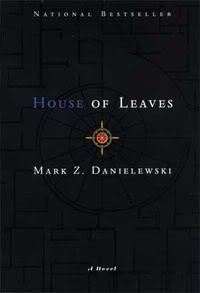 House of Leaves (2000) was written by Mark Z. Danielewski. It has been described that in the early stages of the book it began circulating from drug addicts to porn actors as a stack of loosely binded sheets. It has been considered as "One of the most ambitious, complicated, and eagerly anticipated literary debuts of the year" said Newsweek. It is an amazing novel of mystery, science-fiction, and horror all wrapped into one plot.
House of Leaves (2000) was written by Mark Z. Danielewski. It has been described that in the early stages of the book it began circulating from drug addicts to porn actors as a stack of loosely binded sheets. It has been considered as "One of the most ambitious, complicated, and eagerly anticipated literary debuts of the year" said Newsweek. It is an amazing novel of mystery, science-fiction, and horror all wrapped into one plot.The story is narrated by Johnny Truant. He is a tattooist living in the dark city of Los Angeles. He tries to find an apartment with his friend Lude and they learn that an old man, named Zampanò, recently died in his home. While looking through the apartment, they discover a manuscript. The manuscript is a research essay written by Zampanò on a series of documentaries put into one film by the genius director Will Navidson called The Navidson Record. Throughout the manuscript, it details how Will Navidson and his family began to live in a house where, in a normal afternoon, found that the inside was bigger than the outside, which lead the family into relationship complications. This event filled Navidson and his group of friends with curiosity to explore the house to encounter and film many strange incidents.
The novel is a play on the academic format standards in the English language. It is highly experimental, in that you will see footnotes within footnotes, an exhaustive and invented bibliography for the most part, typographical layouts are brilliantly placed unconventionally and progressively as you immerse yourself within the story, and stories from different points of view crossing each other as one comment or complement the other.
House of Leaves is a wonderful serenade to language. From each point of view the dialects radically change , and the novel flips many times from the gritty, dirty-mouthed Truant to an academic Zampanòian writing, leaving you with the impression of movement. You must have a good amount of ADD to enjoy it since it is highly detailed in describing normal, everyday things. There are many sections that are simply adding "notes" to certain texts (even invented ones), pages devoted to four-word sentences, and extended comments about a particular idea relating inside of the plot, as well as outside of it.
I recommend this book to anyone who will enjoy the dark and twisted perils literature can bring to the reader, especially with the innovative approach to the novel that Danielewski took.
Sigur Ros - Agaetis Byrjun
No comments:
Post a Comment